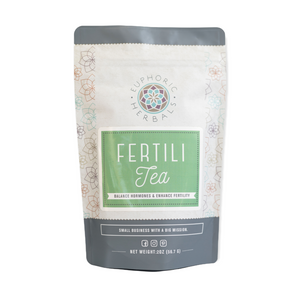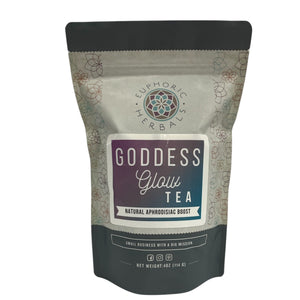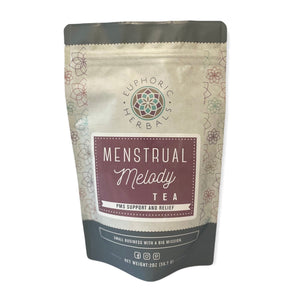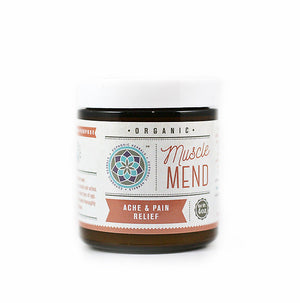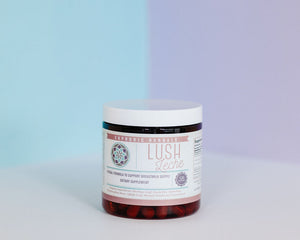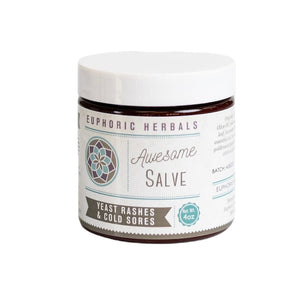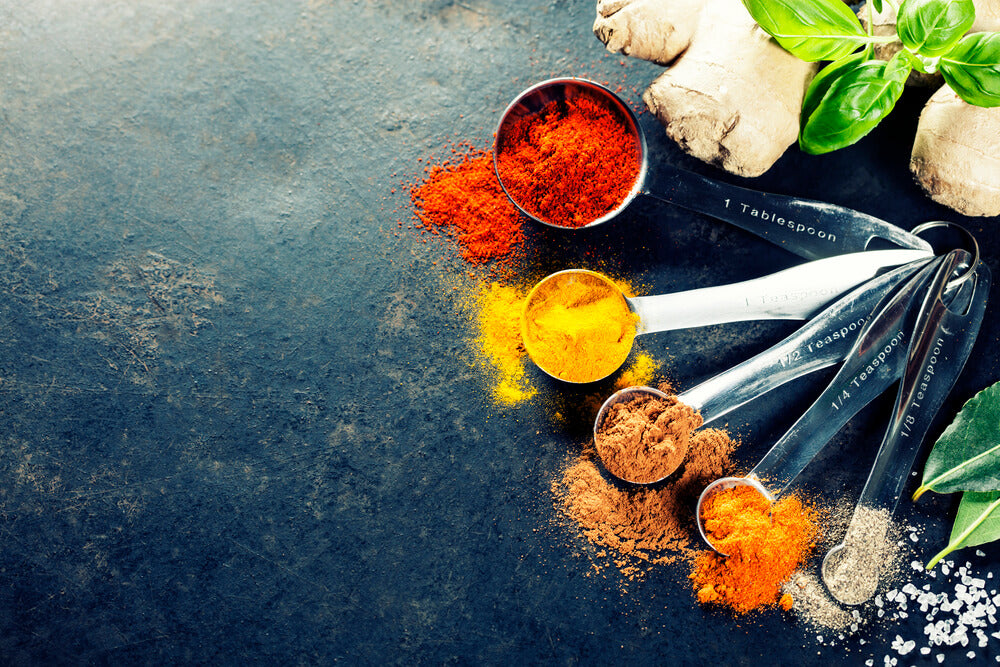Inflammation is your body's response to infection or injury. It helps you to heal and recover, supporting the natural repair process.
However, because of constant stress, poor diet, toxic overload, and other factors, many people today develop a not so good type of inflammation known as chronic inflammation. It's believed to be a root cause of many diseases, including diabetes, arthritis, heart disease, and neurodegenerative disorders. (1)
One way to combat inflammation is to turn to certain herbs and spices that are loaded with antioxidants and anti-inflammatory power.
Here's more about the top choices that support healthy inflammation levels and do other good things for your body, too.
Top Anti Inflammatory Herbs and Spices
Ginger

Ginger is full of powerful compounds, like gingerol and zingiberene, that have shown an ability to help lower inflammation and inflammatory markers. The spicy root is especially helpful for nausea and other digestive issues and can be taken as a tea to help with the pain and inflammation of menstrual cramps. (2)
There's even been some research showing that taking ginger daily can help with the pain, inflammation, and mobility issues associated with osteoarthritis! (3)
Turmeric
Turmeric has become somewhat famous for its inflammation-fighting power. It contains a potent plant compound known as curcumin that is believed to be responsible for its anti-inflammatory effect, which is so strong that it has been comparable to nonsteroidal anti-inflammatory drugs (NSAIDs) in certain studies. (4)(5)
However, because curcumin is hard for the human body to absorb, it's usually most effective when taken with black pepper extract, like in this Turmeric Tonic.
Green Tea/Matcha
Green tea and matcha (a more concentrated version of green tea) are both excellent herbs for reducing inflammation. They contain very powerful antioxidants, including one known as epigallocatechin-3-gallate (EGCG), that have strong anti-inflammatory effects. (6)
These antioxidants can be beneficial for anyone but have especially shown therapeutic effects for cancer, obesity, diabetes, cardiovascular disease, and neurodegenerative diseases. (7)
Cloves
Cloves have one of the highest antioxidant contents out of all herbs and spices. They have over 60 times the antioxidant power of blueberries and rank sixth highest on the list of all measured foods. (8)
This extremely high antioxidant content is one of the reasons cloves have strong anti-inflammatory power. Clove oil was once used for toothaches and seems to have specific effects against liver inflammation. (9)(10)
Cinnamon

Cinnamon, one of the world's most popular spices, is full of antioxidants and plant compounds that give it anti-inflammatory properties. It's one of the best herbs for diabetes support and has shown potential to help with other diseases involving inflammation, including rheumatoid arthritis and non-alcoholic fatty liver disease. (11)(12)
Perhaps the best part is that cinnamon is easy and delicious to consume as a powder, sticks, or cinnamon chips.
Meadowsweet
Not everyone has heard of meadowsweet, but it's absolutely one of the top anti inflammatory herbs and spices. Meadowsweet contains the natural form of salicylic acid, which was discovered and synthesized into the main ingredient in aspirin-- a pain reliever and anti-inflammatory drug.
Research has confirmed that meadowsweet has anti-inflammatory properties. It also (unlike aspirin) has a soothing, protective effect on your digestion. (13)
You can use dried meadowsweet to make tea or take it in something like this Inflamma Response Extract.
Chamomile
You may be familiar with chamomile as a highly popular sleep tea, but it also possesses anti-inflammatory and antispasmodic properties that make it especially soothing for digestion. It has also traditionally been used for headaches, arthritis, and inflamed skin. (14)
Taking chamomile is as simple as using the dried flowers to make a stress-relieving tea or regularly taking the extract.
Cayenne
Cayenne is a fiery spice that contains capsaicin, a compound with both anti-inflammatory and pain-relieving properties. It can impart this effect to your body when you consume it (plus boost your immune system and support your heart), but it's especially effective when used topically for inflammation. (15)
As a perfect example, you can use this Herbal Muscle Rub that contains cayenne and other herbs.
Peppermint & Spearmint

Two closely related herbs, peppermint and spearmint, are particularly good herbs for reducing inflammation and distress associated with the digestive tract. Both have been shown to help with symptoms of irritable bowel syndrome (IBS) and contain menthol, which helps with pain relief. (16)(17)(18)
Any type of mint tastes delicious in a tea, and you can also try peppermint in this Intestinal Soother Extract to calm your digestion.
Lemon Balm
Lemon balm is another herb in the mint family with anti-inflammatory power. Like peppermint and spearmint, it has an especially calming effect on digestion and can also be used for a headache. Studies have also shown that the essential oil is particularly powerful against inflammation of various kinds. (19)
You can easily use dried lemon balm leaves to make a stress-relieving tea or take lemon balm extract daily to support your body.
Rosemary
Like some of the other herbs on this list, rosemary is high in antioxidants, which is part of the reason it can help reduce inflammation. In the herbal world, rosemary is often thought of as a "brain tonic", so it's no surprise that research has found it may combat brain inflammation and prove therapeutic for Alzheimer's disease. (20)
As a bonus, rosemary can also help with pain and has been used for ailments like headaches, menstrual cramps, and arthritis.
Adaptogens
Adaptogenic herbs are unique because they help your body to cope with stress and have a "normalizing" effect. Basically, they restore balance to body and mind, helping with inflammation by lowering stress and other inflammatory triggers.
Some specific adaptogens that can be thought of as anti inflammatory herbs or spices include ashwagandha, astragalus, tulsi (also known as holy basil), rhodiola, and licorice root.
Bonus: 3 Skincare Herbs for Reducing Inflammation
Calendula

Calendula is one of the best herbs you can use for skincare, aiding a wide range of skin conditions. It soothes irritation, promotes wound healing, and (of course) has anti inflammatory properties. (21)
To use calendula for angry skin, look for it in a cream or salve-- something like this Calm Cream. You can also take it internally as a tea or tincture.
Lavender
It would be hard to think of a more familiar skin-soothing herb than lavender. Like calendula, it soothes inflamed and irritated skin and even has antimicrobial properties that help to keep skin healthy and fight certain pathogens. (22)(23)
When taken internally or used in aromatherapy, lavender can also help with stress, sleep, headaches, and digestion.
St. John's Wort
St. John's wort is often associated with depression due to its powerful effects on mood and mental health. However, it also has lesser known, though equally powerful, skin-soothing benefits and potent anti-inflammatory properties. (24)
You can use St. John's wort for everyday scratches, burns, and bruises as well as generally irritated skin. It's very easy to apply in an ointment like this Super Salve.
Fight Inflammation Naturally with Herbs & Spices
As you can see, nature has given us many powerful inflammation-fighters, even more than would fit on this list. One key to using them effectively is to take your herbs daily and consistently for a period of time rather than expecting an immediate result.
Don't forget to consult a qualified herbalist or physician if you are pregnant or dealing with a medical condition before taking new herbs, and enjoy the process of supporting your body naturally!
Disclaimer: This post is for informational purposes only. It does not constitute medical advice and should not be substituted for medical advice. Please consult your health care provider, herbalist, midwife, or naturopathic physician before taking herbs, supplements, etc. Here's the link to our full disclaimer.






















































